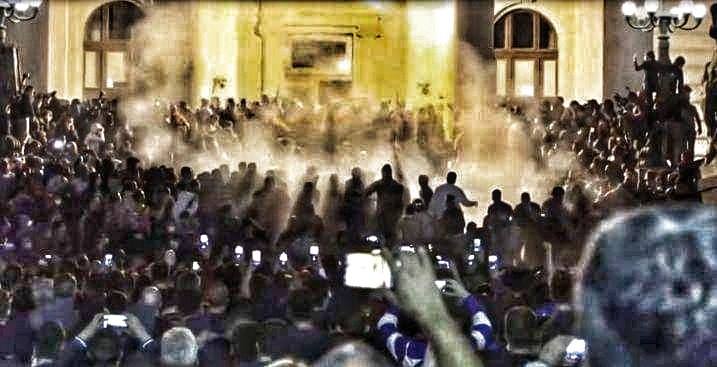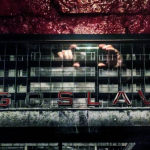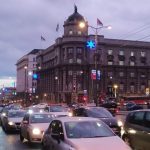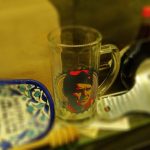This time we’ll let our friends from Belgrade take the floor. As they actively participated in the night protests and stormed the Parliament together with thousands of other Serbs, they’ll explain best why these riots and clashes with police forces even happened in the first place.
Polish version of this article was published on July 7th: https://naszaserbia.pl/protesty-w-belgradzie-dlaczego-serbowie-zaatakowali-parlament/
For obvious (we hope) reasons we’ve changed the names of our interlocutors. To help understand the situation better, at the end of this article we’ve also added a brief summary of how Serbia is managing the coronavirus crisis.
What Happened?
On Tuesday, July 7th, President Aleksandar Vucic announced that the Friday – Sunday curfew would be restored in Belgrade. The decision was backed, as he emphasized, by the “tragic” epidemic situation in the capital city.
Soon after Vucic’s press conference people started to gather in front of the House of the National Assembly of the Republic of Serbia. Preliminary estimation was around a thousand protesters, but even a quick glance at the video reports of that Tuesday night would appear to show that there was a couple of thousand of them, at least.
Protesters shouted “Thieves!”, “Vucic, go cure yourself!” and “Resignation!”. After some of them (a few or a dozen or so) managed to get inside the building, police forces got involved. The crowd dispersed but that didn’t end the protest.
Right from the start there were multiple attempts to “hook up” to the protest by various groups such as anti-vaxxers who suggested that it was a mass-protest against vaccinations (during the press briefing Vucic mentioned that before fall the government will vaccinate two million citizens for seasonal flu in an attempt to help fight the coronavirus; mostly medics, soldiers, seniors and children would get vaccinated). Anti-5G movement stated that the crowd in Belgrade opposes setting up 5G masts. Some other groups stated that the protest is against accepting immigrants to the country.
It seems that some representatives of anti-vaxx, anti-5G and anti-immigration movements actually did participate in the event. However, the main driving force behind the protests was a collective disappointment and disapproval for Vucic’s political agenda and the way he rules the country.
Stop The Dictator!
Among those gathered outside the Parliament, there were some of our friends – born and bred Serbians living in Belgrade. We’ve altered their names for privacy and safety reasons but we have translated their words with great accuracy and without any adjustments, shortcuts or changes.
Alex: I was in the middle of riots. I’ve attended the protest because I don’t want to live in a country terrorized by Vucic anymore. After I got back home I was still experiencing the effects of the tear gas for a couple more hours. Now it’s fine. I’m going today as well.
Iva: I know it’s dangerous and irresponsible due to coronavirus because people there are in close proximity to each other, some don’t wear masks, a lot can get hurt and be taken to hospitals where it’s very easy to catch the virus or spread it over. But we don’t have any other choice, we must protest. I don’t want riots in the city, I don’t want people to fight with the police. Yet, Vucic is a dictator trying to destroy Belgrade. He wants to lockdown Belgrade and only Belgrade. Earlier he made wrong decisions, publicly speaking that there’s no virus, that there’s nothing to worry about. He was saying that right before the election. He didn’t care about risking lives of people who believed him. He did it, won the election. And now the subject of coronavirus is back and he wants to lock us all down, just like in jail.
Alex: The day Vucic won again, government controlled media restarted their propaganda. Again they started to inform us that the virus is dangerous. They blamed people for the increased number of infections. According to them, Vucic saying – for the needs of his presidential campaign – that the virus is harmless, he isn’t the guilty one. They made it look like all the blame falls on the heads of those who actually believed him.
Vukasin: It’s all true. Before election the subject of the dangerous coronavirus ceased to exist in government media. After election Vucic is on TV everyday and says that we all are guilty, that we are bad, that people are getting sick and dying because of us and that he’s the “kind spirit” trying to fix everything.
Iva: Vucic always puts the blame on others. He often says that Serbia is the best country in Europe and that we are in the best situation and so on. And the truth is that ¾ of people here are barely able to make a living month to month.
Alex: We went on the streets because we had enough. At first, the police supported us, it seems. But then there was a tear gas, shooting, police aggression. On top of that, mainstream media stayed silent about what was happening in Belgrade even though there were thousands of people on the streets. I think maybe two privately-owned TV stations were broadcasting live and informing about the situation. Supposedly some “hackers” attempted to break-in into their websites and stop them from doing those live relations. Additionally, “somebody” made those two channels that were showing the truth… “somebody” made them disappear from cable networks.
Vukasin: Vucic ordered a road block between Novi Sad and Belgrade on Wednesday. He knows that there’ll be more protests and doesn’t want people from outside Belgrade to join us.
Iva: During today’s conference Vucic mocked the protesters up, called us “flat earthers”. He said we’re far-right extremists and that we are funded by foreign countries. He’s a sick man, you never know what will come to his mind. Apparently, he brought additional police forces to Belgrade. I’m afraid that this way he only wants to increase chaos.
Alex: The curfew is cancelled. I think it was Vucic’s idea and he hoped to avoid further protests this way. But we’re entering the streets again today. Probably there’ll be less of us because people got scared of those additional policemen and chaos. But we are going. We don’t want to live in a dictatorship.
Anti-Vaxxers, Flat Earthers, Foreign Influences
On Wednesday Alexandar Vucic held a press conference and stated that on Tuesday and Tuesday night brutal violence acts were conducted by politically motivated “right-wingers” and extremists. Allegedly an “outside factor” was involved. Vucic stated that the protest was controlled by external forces from balkan region. He assured that he’s got proof but is not willing to expose them at this moment as he’s waiting for an official serbian service report.
Vucic emphasized that the protest and attack on the House of the National Assembly of the Republic of Serbia were not related to coronavirus and the way governments fights the epidemic.
He called Tuesday’s events the most brutal acts of violence recently. He pointed out that in the last eight years the Republic of Serbia fully respected freedom of gathering and expressing different opinions (in 2012 Vucic became first Deputy Prime Minister). He called Tuesday’s protests a political event: illegal, not submitted to the police, conducted against the law, started by far-right extremists. He mentioned that the police took action only after protesters got into the building of the National Assembly. He also emphasized that police officers only reacted to actions of aggressive participants of the event but “decent citizens” were left undisturbed. Speaking about protesters, the President of Serbia stated that it was another organized action: “These people didn’t talk about any coronavirus – they spoke about some treason, migrants, 5G network and flat Earth. They already gathered in front of the House of the National Assembly in the past but back then the level of their aggression wasn’t so high”.
President also said that the protesters caused huge material losses and made the reputation of Serbia worse. He concluded that as a result of the protest five police vehicles were destroyed and 43 policemen injured. Vucic declared that the police behavior was exemplary. Asked about a video (included below) that shows a group of police officers attacking men that are just sitting on a bench in the park, he said that “people on that bench were involved in an attack on police”.
Serbian President also informed that during the last 24 hours 357 new cases of coronavirus infections were recorded, 11 patients died and 118 were successfully healed using ventilators. Due to the increased number of infections he called Belgrade residents to stay at homes.
Vucic announced also that the Crisis Staff meeting will be held on Thursday and that the curfew in Belgrade will probably be cancelled. He made it clear that he’s opposed to such lifting of restrictions.
Gepostet von Marko Djurica am Dienstag, 7. Juli 2020
Coronavirus and coronachaos
By the end of February, while the world was anxiously watching the growth of the epidemic, serbian President ran a press conference and ridiculed the danger calling coronavirus “the funniest in the world” and encouraging serbian women to go to Italy for shopping. It didn’t change even after March 6th, after the first coronavirus case in Serbia was confirmed (then and afterwards authorities were often reminding that the “patient zero” often traveled to Bucharest and supposedly brought the virus from there). Vucic reassured that “If we notice an increase of cases, it will be five, ten, maybe twelve of them. Surely not hundreds, not like in Italy”. Vucic promised that the country is well prepared and has sufficient number of ventilators, that serbian health service is more efficient than “western” one and that the government can count on help from befriended China.
However, only on March 15th Serbia has declared the state of emergency: sealed its borders (on the contrary to prior reassurance), shut down schools, imposed 28-days quarantine for newcomers, limited public transportation services, shortened opening times of restaurants and pubs and such, put soldiers on the streets to patrol areas nearby hospitals. There was 48 cases back then. Vucic didn’t dismiss the danger anymore but stated: “Serbia is at war with an invisible enemy”.
Soon the President informed the people that the election scheduled for April 26th will be postponed to another date. More restrictions were announced: seniors were not allowed to go outside, a police-controlled curfew was imposed, the army took control over borders and camps for illegal immigrants. Despite that pubs and restaurants were still open (just with shorter opening hours and theoretically limited number of customers allowed).
Ultimately, on March 20th the border was closed and authorities explained an increase in the number of infections with the irresponsibility of Serbs permanently living abroad who (being already infected) decided to go back home because – as government states – they knew they’d be better treated in the country than in the West. President also said that together with the government he only made a single mistake if it cams to fighting coronavirus and that was allowing Serbs from abroad to enter the country: “we showed how big Serbia is and how big heart it has and now we are all going to pay a high price for it”.
There was a chaos of information. President Vucic blamed and reprimanded citizens at one time and assured that Serbia is well prepared for the crisis and soon will start mass-testing for coronavirus at another time. His statements were very often corrected by an experienced epidemiologist Predrag Kon who was explaining that the country doesn’t have sufficient resources to conduct such mass-tests (later 65-year old Kon undermined publicly enthusiastic declarations of the government multiple times; he said that he’s near the end of his career anyway so he can allow himself to make statements that are not in line of the prevailing political agenda).
Then dramatic videos and reports from overcrowded hospitals started to emerge over the web. Health service workers started to speak loudly about shortage of the most basic safety measures and gear in hospitals. They suggested that tests from China are unreliable and the data on the number of sick and dead due to COVID-19 provided by the government is understated on purpose. A journalist who wrote about a critical situation in one of the hospitals in Vojvodina – she was detained by the police. In response to more publications contradictory to official narrative a decree was issued on April 1st that allowed only government crisis staff members to inform about the epidemic situation (in order to prevent spreading “fake news”). After some protests and intervention of international organizations the decree got withdrawn.
Due to the lack of social self-discipline there was a curfew applied for a few days over Easter. By the second half of April authorities announced that apart from a few “hot-spots”, epidemics in Serbia is under control. Some voices occurred that restrictions will only be lifted once the number of infections daily will go down to zero.
But despite an increasing number of infections, restrictions were gradually removed until May 21st, a month before the postponed election, when the government decided to open borders fully again. A campaign was started and Serbia got back to living, just like before the epidemic. A symbol of “normality” was a semi-final Serbian Cup game Partizan vs. Red Star in June. It was attended (different sources state different numbers) by 20 to 30 thousands of football fans.
Some people were happy with getting back to normal, some – because of a general relaxation of the situation – maintained an even more strict sanitary regime, others pointed out that the government doesn’t inform regularly about new cases anymore.
After the election on June 21st (won by Aleksandar Vucic’s party) the coronavirus subject made its way back to regime media (independent media and social media never stopped updates on the alarming epidemic situation in the country and hospitals’ problems). On July 3rd Vucic admitted that the situation is bad and in Belgrade, where over 80% of new cases are noted, is actually critical. Vucic announced restrictions (limiting activities of bars and clubs at nights, fines for not wearing masks and so on) and said that if it was up to him, he’d “lock Belgrade down entirely and impose a full curfew”.
Four days later, during a press conference on Tuesday (July 7th) President Aleksandar Vucic announced that from Friday until Sunday there’ll be a curfew in Belgrade (or, as he said, “going out will be prohibited”). After the conference people went out on the streets and started to storm the House of the National Assembly of the Republic of Serbia building.
Polish version of this article was published on July 7th: https://naszaserbia.pl/protesty-w-belgradzie-dlaczego-serbowie-zaatakowali-parlament/
Przygotowanie tego artykułu zajęło nam bardzo dużo czasu. Jeśli Ci się spodobał – jest nam bardzo miło. Udostępnij go w swoich social mediach (możesz to zrobić korzystając z przycisków powyżej) lub kopiując adres URL.
Jeśli chcesz przedrukować (wykorzystać) dłuższy fragment lub całość wpisu – skontaktuj się z nami w celu uzyskania zgody.



